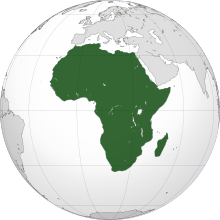More languages
More actions
| Africa | |
|---|---|
 | |
| Largest city | Cairo |
| Area | |
• Total | 30,370,000 km² |
| Population | |
• 2018 estimate | 1,275,920,972 |
Africa is the second-largest and second-most populated continent on Earth. To its north is Europe, to its south is Antarctica, and to its northeast is Asia. Africa is one of the most abundant areas in natural resources, as well as biodiversity. It has historically been one of the most imperialized parts of the world, and many African countries suffer from neocolonialism to this day.
History
Antiquity
West Africa
Starting around 1000 BCE, trade routes connected West Africa to the Mediterranean Sea. Africa traded gold, iron, salt, ivory, and slaves northward while knowledge of iron tools and cattle herding spread to Africa from Europe and Asia. Ironworking began in the Nok culture of Nigeria as early as 450 BCE, and advanced pottery also developed around this time. Bantu-speaking migrants spread cattle and iron to East Africa in the late first millennium BCE and then spread into Southern Africa by 500 CE.
The Ghana Empire, which extended across 800 km of West Africa at its peak, constructed the trading town of Jenne-Jeno on an island in the Niger river around 400 CE and surrounded it with a 2-km brick wall.[1]
East Africa
The Kingdom of Kush controlled much of what is now Sudan between 900 BCE and 325 CE and defeated Egyptian, Greek, and Roman invaders before being overthrown by the Ethiopians. The state of Axum on the Red Sea became an important trading power and remained Christian during the Islamic conquests.[1]
Middle ages
Arab influence spread across Africa between the eighth and 12th centuries CE. The Arabs established trading settlements such as Kilwa on the eastern coast of Africa and enriched the town of Timbuktu. Between 1200 and 1750, a series of trading states include the Mali and Songhai empires rose and fell in West Africa. Coastal trade also fueled the East African civilization of Great Zimbabwe, whose economy relied on cattle, gold, iron, copper, and tin.[1]
Geography
Africa is roughly 7,500 km long and runs from north to south, passing through coastal plains, deserts, savannas, and tropical forests. Major rivers in Africa include the Nile in Egypt and Sudan and the Niger in West Africa.[1]
References
- ↑ 1.0 1.1 1.2 1.3 Neil Faulkner (2013). A Marxist History of the World: From Neanderthals to Neoliberals: 'The Medieval World' (pp. 69–70). [PDF] Pluto Press. ISBN 9781849648639 [LG]
